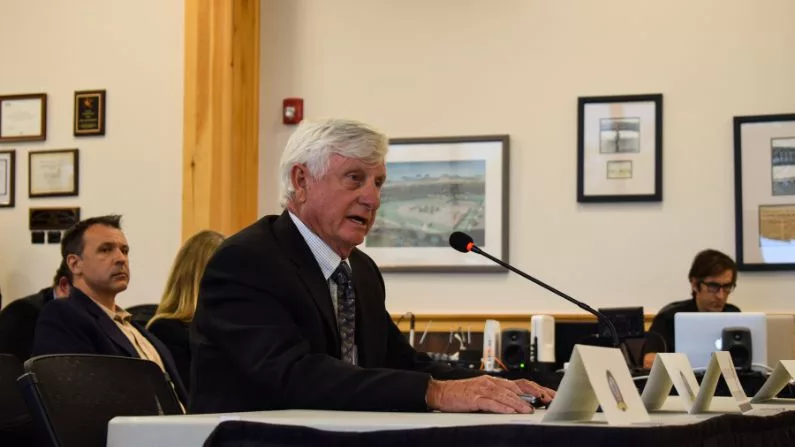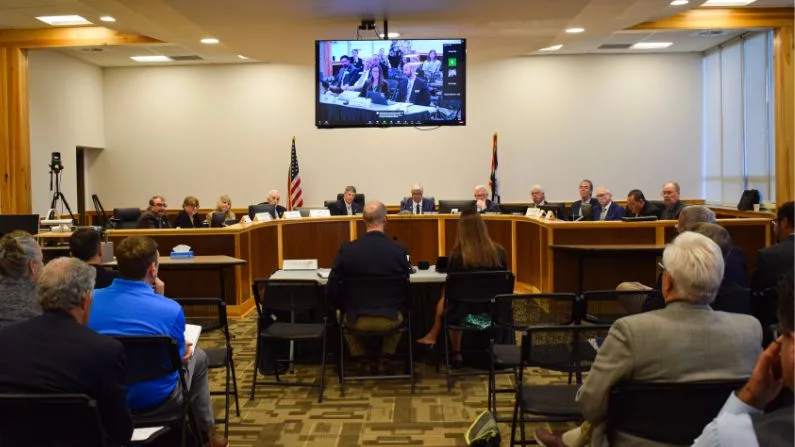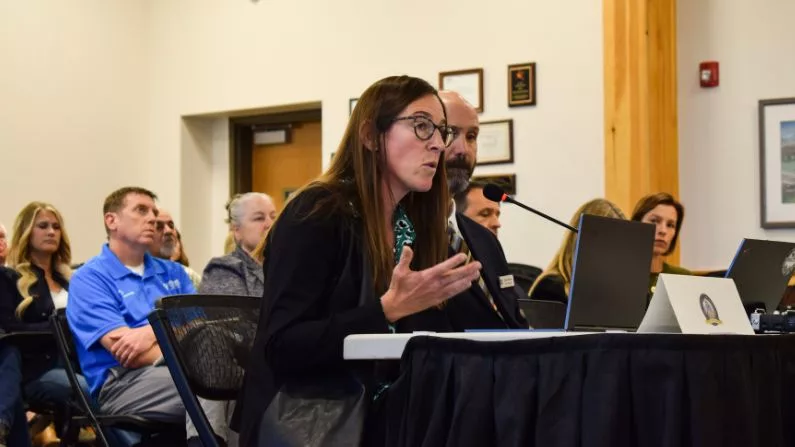State lawmakers plan to continue zeroing in on Teton County’s housing crisis. The Regulatory Reduction Task Force met for hours in Lander Thursday with Jackson and county officials, along with a handful of disgruntled county residents who were upset about local regulations.
Thursday’s conversations could culminate in legislation next year, which could limit Teton County and Jackson’s ability to regulate housing development within its own borders.
“It’s really a huge issue about local control,” said Jackson lobbyist Andy Schwartz prior to the meeting, adding that lawmakers could restrain Teton County’s housing mitigation program, which requires developers buy into housing for local workers, and impact plans for over 1,500 affordable homes in Northern South Park.
Thursday morning, 30 people filled a boardroom in a Lander school building. Around a third of them were from Teton County — elected officials, town staff and concerned residents.
Kelly Lockhart, a longtime rancher who owns land south of Jackson, encouraged state lawmakers to overhaul local zoning regulations.
Lockhart urged members of the Regulatory Reduction Task Force to “air on the side of free enterprise, market solutions, less taxes and less government.”
“The government by nature is inefficient,” he added.

Kelly Lockhart, a longtime Teton County rancher, advocated for less regulations on private developers. (Hanna Merzbach/KHOL)
The task force was created last spring to make Wyoming a more business-friendly state, limiting regulations on oil and gas, mining, agriculture and construction. But, housing issues in the western part of the state quickly bubbled to the surface.
Lockhart’s message resonated with State Senator Bob Ide, a Republican from Casper.
“To me, it looks like the local government is sort of the ringmaster here on the growth, the direction of your town,” Ide said to Lockhart.
Creating affordable housing
Teton County and Jackson’s affordable housing program also came under fire, as task force members questioned if it’s actually helping the crisis at hand.
Jackson/Teton County Housing Director April Norton told the group that there’s currently 1,500 deed-restricted homes in the county, and almost a thousand more are in the pipeline.
“I think that really reflects a measured and balanced approach,” Norton said.
Fielding questions from task force members, Norton tried to explain the magnitude of the problem. She said that even houses in neighborhoods like Rafter J, which was originally created for the workforce, are going for two million dollars.
According to Norton, the growth of global demand for Teton County has far outpaced that of local wages, and leaving housing development to the free market will not solve the region’s affordability problem.
“It’s hard to imagine that new construction can be affordable to … middle class local workers,” Norton said.
But some task force members took issue with the town and county incentivizing affordable housing, claiming they’re sidelining the private sector.
Norton explained that developers that partner with the public sector to build affordable housing get to move faster through the planning process.

Housing Director April Norton and Jackson Town Manager Tyler Sinclair provide details on the region’s affordable housing efforts. (Hanna Merzbach/KHOL)
Property taxes, she said, are also lower for residents living in deed-restricted homes, since they have a lower value.
“I don’t know how you can do that,” said task force member and former state senator Eli Bebout, who’s from Riverton. “Our constitution says uniform and equal.”
Speaking to KHOL after her presentation, Norton said the method’s Teton County uses are different from the rest of the state.
“Our market forces are definitely different than the rest of the state,” Norton said.
She said she’s still seeing misunderstandings about what’s actually happening in the region.
“We’re kind of talking past each other,” Norton said.
Mixed opinions from Teton County residents
Tyler Sinclair, the town’s manager, also explained Jackson’s housing program. Town council member Arne Jorgensen attended the meeting, but chose not to provide testimony.
Local resident Jim Darwiche did however take the stage. He explained to task force members that his family has been trying to develop the former assisted living facility, Legacy Lodge, into housing for a few years.
“Getting approval has been a nightmare,” Darwiche said.
Representatives of the Gill family also aired frustrations about what they described as a tedious process breaking ground. The family owns much of Northern South Park and have agreed to let nonprofits build affordable housing on some of that land — alongside free market homes — but they said it’s been slow going.
Teton County has yet to publicly release draft regulations for the development.
“We’re still at the table. We want to opt in to this,” said the family’s spokesperson, Liz Brimmer.
But she claimed that other housing projects are being prioritized instead, and urged the state to incentivize private development of affordable housing, along with preventing additional “discouraging” fees and taxes on development.
“Private projects can be a tool for affordable housing,” Brimmer said. “Government-controlled housing can’t be the only tool.”
But Clare Stumpf, with housing advocacy nonprofit Shelter JH, was supportive of the county’s efforts. She told task force members that voters support the solutions elected officials are currently putting forward.
“Most importantly, we really need to keep our local decision-making local,” said Stumpf.

Teton County Deputies Lia Stanton and Sara King attended the meeting to speak about the importance of affordable housing to ensure community safety. (Hanna Merzbach/KHOL)
She added the community is deteriorating with people being pushed out. That includes Sara King, a deputy with the sheriff’s office who testified in full uniform.
King said she lives in Lincoln County, and the 45-minute commute has made it hard for her to respond to critical incidents.
She said out of 20 patrol deputies, only four are living in Teton County.
“It’s pretty imperative that we have first responders living in Teton County,” King said. “But unfortunately, with the current state of things, we’re just unable to do that.”
Teton County is not alone
While much of the discussion centered around Jackson and Teton County, several officials from other parts of the state said they are starting to feel the housing crunch as well.
Matt Hall, the mayor of Cody, said his constituents are starting to be priced out of the town, and employers are having to think about housing their workers.
“Who’d of thought we would be in that situation in Cody,” said Hall.
He argued that regulation isn’t the problem, and local officials need access to as many tools as possible to address the crisis.
“Allow your local governments to do their job to help solve some of these problems,” Hall urged the committee.
Jenny Craft, who’s working on housing issues in Sheridan, said she’s taking the lead from Teton County in pursuing private-public partnerships and creating a housing trust.
“What we’ve seen, from our perspective, is a very successful model in Teton County,” Craft said, “and not intending to reinvent the wheel but to follow in the successes that they’ve seen.”
Before wrapping up the meeting, members of the Harvard Growth Lab — which is partnering with the state to propose housing solutions — urged the task force to consider more free-market options.
They also suggested policies such as front-loading public hearings, and eliminating building height and parking space requirements, among other zoning reforms.
The group said it aims to propose locally-targeted reform packages, which could require local and state-level changes.
What’s next
In his closing statement, task force co-chair Representative Bob Nicholas, a Cheyenne Republican, said he toured Jackson a few weeks ago, meeting with people on both sides of the debate.
“I have a different perspective of the world now,” Nichols said. “It is amazing how much construction is going on in that community right now. It’s rather remarkable.”
He continued, “The more we learn, the better job we will be able to do.”
Reflecting after the meeting, his co-chair, Senator Mike Gierau, a Democrat from Teton County, said the task force is starting to understand how complicated the issue is.
“Finding out what really, truly does help affordability is, you know, something that’s an elusive goal,” Gierau said, standing outside the school building.
And when it comes to the debate over regulations in Teton County, Gierau comes down somewhere in the middle.
“Both sides are not wrong,” Gierau said. “Both sides are not right on this issue. There is work we can do to make less regulation … and it needs to be more simple, streamlined.”
The co-chairs requested from the state that the Regulatory Reduction task force continue its work into the next year, and that they form a specific subgroup to address housing issues in Teton County.
Gireau said ideas are circulating about bills the group may recommend to the legislature, but nothing is in writing yet.
“Let’s take a measured approach,” Gierau urged. “Don’t knee jerk anything.”
The next task force meeting is slated to be online on Oct. 18.






